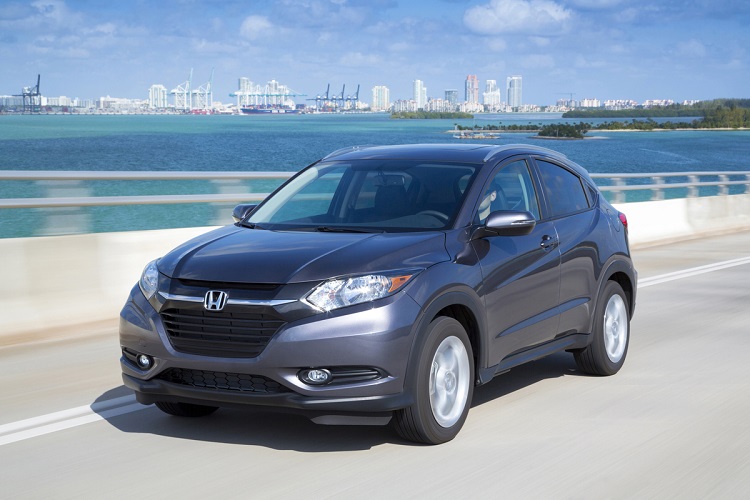The company co-founded by Soichiro Honda was first a motorcycle manufacturer. It was a formidable competitor on the racing circuit, but made its name with the rider-friendly Dream and Cub. These bikes were not overly powerful, but ran like little finely-tuned sewing machines that rewarded their owners with efficiency, utility, and longevity. They seemed like friends. That’s pretty-much the formula also employed with cars like the Civic, Accord, and every other Honda since. Mr. Honda would love the 2016 HR-V.
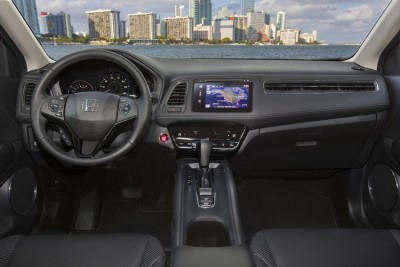
Looking face-on, there’s a connection to other Hondas through its big grille and high-set headlamps. As with the new Pilot, there’s no pseudo-SUV pretentions; the arching roofline, kicked-up rear windowline, and deep swooping side sculpting are all crossover. Rear doorhandles are cleverly hidden in the C-pillar. It looks expensive, tough, stylish, and undeniably Honda.
Stylists had their way with the interior too. Unlike the over-wrought controls in Odyssey mini-vans, the HR-V packs a ton of technology in a fresh, user-friendly environment. The fly-bridge center console with huge adjustable cupholders and shifter spans a lower storage area with USB port. Almost everything feels expensive and upholstered with stitched faux leather. Audio, navigation, and climate are controlled with a swipe-sensitive touchscreen above and glassy touchpad below. I’d still prefer simple knobs for volume and tuning, but heated leather seats and sunroof accompany any climate.
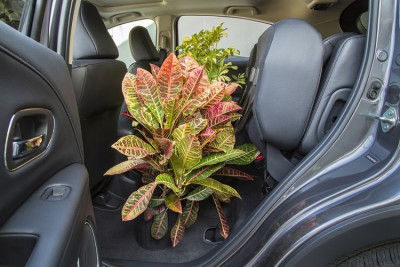
Like the Fit on which it’s based, the HR-V is packed with enough storage tricks to excite a tiny house maven. Even with four aboard, there’s enough luggage space. Flip the rear seats and front seat to fit in a bicycle or surfboard. Creative placement of the gas tank allows the rear seat bottom to flip up to haul large items across the floor. Given the HR-V’s small footprint, it can swallow a cave’s worth of stuff.
If ever there was a car in need of a good turbo, this is it. It’s not the 141 horsepower 1.8-liter four-cylinder engine that betrays it, but the continuously-variable transmission (CVT) and all-wheel-drive that zap the fun out of anything that could have been fun. Step into it getting on the freeway and you’ll think Zeus is in an epic battle with your power drill. Only press the green “Eco” button if you want to numb the throttle and shift points to maximize fuel economy, which is rated 27/32-MPG city/hwy.
When not racing something as sprightly as, say, a mini-van, it’s actually enough power to slip through traffic and maintain highway speed. Despite their quirky noises, CVTs provide the perfect gear ratio for efficient driving. Set the cruise and the CVT adjusts ever-so-much as needed to go up hills and overcome semi wind resistance – surprisingly pleasant. In Honda tradition, the engine just purrs along. Loaded up, mountains would be an “adventure”, but four-wheel disc brakes keep it all under control.
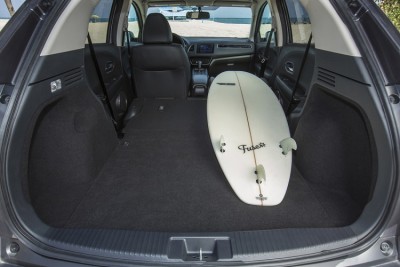
Our vehicle was stocked like an Acura, but there’s a heap of standard equipment on every HR-V. You’ll check no boxes for power windows with driver’s auto up/down, CD player, USB input, Bluetooth calling/audio streaming, 17” alloy wheels, or rearview camera. You’ll pay about $800 more for an automatic transmission. That’s all you really need.
Soichiro Honda built high-revving motor bikes and compact cars. None attracted fans through a monsoon of power, but they offered value and a sense that people who love cars engineered them. That’s the spirt in which the HR-V was created and I’d like to believe Mr. Honda would approve. The little crossover starts at a very affordable $19,115, but came to $26,720 as tested. For $21,000, you’d have a well-conceived car that’s a comfortable companion for life’s journeys.
Storm Forward!
Follow Casey on YouTube and Twitter: @AutoCasey
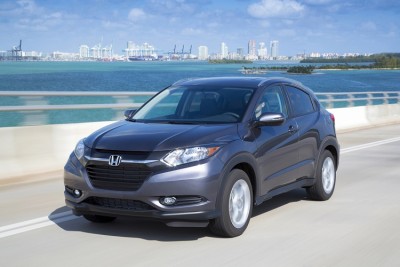
2016 Honda HR-V
Five-passenger, AWD crossover
Powertrain: 141 hp 1.8-liter I4, CVT
Suspension f/r: Ind/torsion beam
Wheels f/r: 17”/17” alloy
Brakes f/r: disc/disc
Must-have features: Style, Utility
Fuel economy: 27/32 mpg city/hwy
Assembly: Celaya, Mexico
Base/as-tested price: $19,115/26,720
